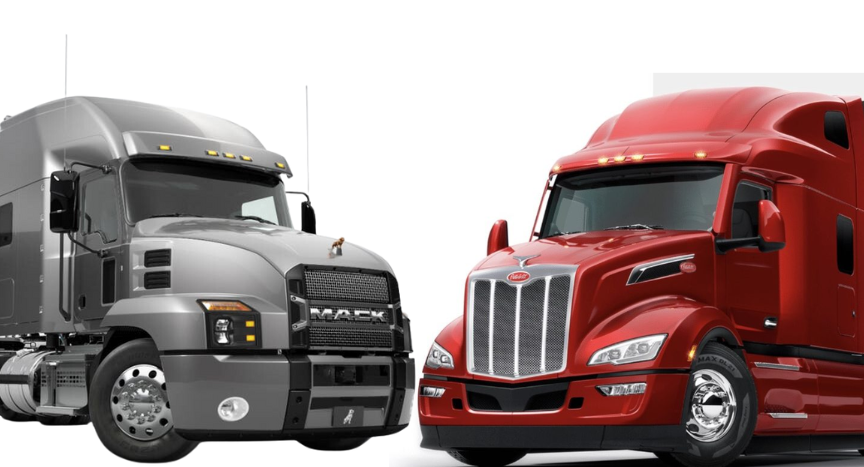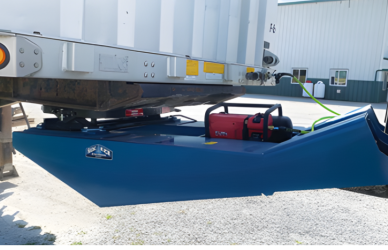When it comes to the trucking industry, Mack and Peterbilt are two powerhouse names that have earned the trust and loyalty of countless drivers. Whether you’re a seasoned professional or new to trucking, understanding the contrasts and commonalities between these brands can clarify which is best suited for your needs. Below, we take a detailed look at Mack and Peterbilt trucks by comparing their performance, design, and overall value.
Brand Background
Mack Trucks
Founded in 1900, Mack Trucks is a brand synonymous with toughness and durability. Now part of the Volvo Group, Mack focuses on manufacturing heavy-duty trucks tailored for challenging jobs, including construction, logging, and off-road applications. Their no-nonsense approach and robust builds make them a staple in industries that demand reliability.
Peterbilt
Peterbilt got its start in 1939 and has since become a symbol of premium truck quality. Acquired by PACCAR in 1958, Peterbilt specializes in highly customizable trucks, making them a top choice for long-haul drivers. With their attention to detail and superior craftsmanship, Peterbilt trucks have garnered a reputation for exceptional value and comfort.
Engine and Performance
Mack:
Mack relies on its proprietary MP series engines, including the MP7 and MP8, which are designed for power and reliability. These engines offer horsepower ratings of up to 505 and torque up to 1,860 lb-ft, making them a perfect match for heavy-duty vocational work. Built with durability in mind, Mack trucks are well-suited for tough tasks.
Peterbilt:
Peterbilt trucks come equipped with PACCAR MX-series engines like the MX-13 and MX-11, with options for Cummins engines as well. These engines deliver up to 510 horsepower and 1,850 lb-ft of torque. Ideal for highway applications, Peterbilt engines are engineered to balance performance with fuel efficiency, keeping drivers comfortable during long hauls.
Design and Comfort
Mack:
Mack trucks are renowned for their functional and rugged designs. With practical features like breakaway mirrors, ergonomic seating, and ample storage space, Mack emphasizes utility over luxury. While their interiors are straightforward, they provide the durability and practicality needed for hard-working environments.
Peterbilt:
Peterbilt trucks shine when it comes to customization and driver comfort. Their interiors feature advanced digital dashboards, high-end finishes, and options for premium materials. Peterbilt cabins are designed with the driver in mind, offering a level of comfort that makes them a favorite among long-distance haulers.
Fuel Efficiency
Mack:
Mack has made significant strides in improving fuel efficiency. Models like the Mack Anthem feature aerodynamic designs and advanced powertrain technologies that help reduce fuel consumption. These innovations make Mack a competitive choice for operators looking to cut operational costs.
Peterbilt:
Peterbilt prioritizes fuel economy through aerodynamic designs and lightweight materials. Their PACCAR MX engines, combined with advanced engineering, enhance efficiency without compromising performance. Long-haul drivers often appreciate the savings and sustainability offered by Peterbilt’s thoughtful approach to fuel management.
Durability and Reliability
Mack:
Durability is where Mack truly excels. Built for rough environments, Mack trucks are a common sight in industries like construction and logging, where trucks need to withstand heavy workloads and challenging terrains. Their legendary toughness ensures reliable performance under stress.
Peterbilt:
Peterbilt trucks are equally reliable but stand out for their longevity and premium craftsmanship. While they’re not specifically built for rugged vocational roles, their robust construction and attention to detail make them exceptionally durable. Peterbilt delivers reliability with an added layer of comfort and refinement.
Cost and Resale Value
Mack:
For buyers on a budget, Mack offers a more affordable upfront cost compared to Peterbilt. Additionally, maintenance costs are generally manageable, making Mack trucks an appealing choice for vocational applications where cost-effectiveness is key.
Peterbilt:
Peterbilt trucks come with a higher initial price tag but excel in retaining their resale value. This makes them a smart long-term investment for those wanting premium quality and the ability to recoup costs when it’s time to upgrade. Their balance of durability and comfort enhances their long-term market demand.
Choosing Between Mack and Peterbilt
When deciding between Mack and Peterbilt, the choice depends largely on your specific needs and priorities:
- Mack Trucks: Ideal for heavy-duty tasks, Mack focuses on practicality, ruggedness, and reliability. Industries such as construction and logging will especially benefit from Mack’s durable design.
- Peterbilt Trucks: Perfect for long-haul drivers, Peterbilt emphasizes comfort, customization, and efficiency. Their high-end interiors and premium build quality cater to those spending long hours on the road.
Understanding the strengths of Mack and Peterbilt trucks helps to highlight why both brands continue to be strongholds in the trucking industry. Mack’s toughness and utility make it a top choice for demanding environments, while Peterbilt’s blend of reliability and driver-focused design appeals to those prioritizing comfort and efficiency.











